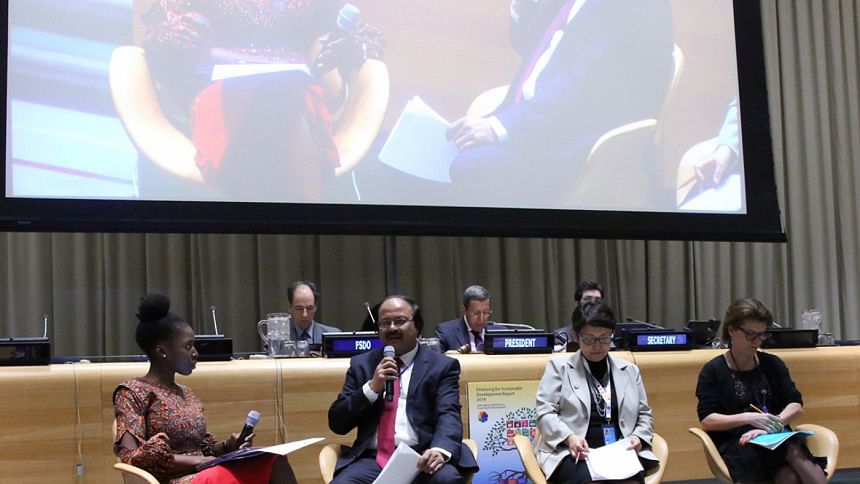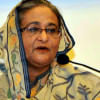6 proposals from Bangladesh for effective multilateral trading system

Bangladesh has made six recommendations for an effective multilateral trading system for sustainable development.
Md Nojibur Rahman, principal secretary to Prime Minister Sheikh Hasina, presented the recommendations while speaking as a panelist at the High-Level Thematic Panel Discussion titled ‘Trade, science, technology, innovation and capacity building’ of the 4th Economic and Social Council (ECOSOC) Forum on Financing for Development (FFD) at the UN Headquarters in New York yesterday.
Sofie Maddens, head of Regulatory Market Environment Division of ITU, and Miho Shirotori, chief of Global and Regional Trade Analysis Section of UNCTAD, were the other panelists of the event.
In this thematic session, the principal secretary along with other panelists discussed several issues such as the steps needed to recognise the multilateral trading system for sustainable development, the equitable distribution of trade benefits, impacts of emerging trends in technology, including in e-commerce on the global landscape for trade, Permanent Mission of Bangladesh to the UN said in a statement.
In his deliberations, Nojibur Rahman came up with some recommendations to make the Multilateral Trading System more effective.
First, the international community must promote a universal, rule-based, open, transparent, predictable, inclusive, non-discriminatory and equitable multilateral trading system. Implementation of the WTO Ministerial decisions is vitally important for the promotion of trade.
Second, it is imperative for the WTO to address the current challenges faced by the international trading system. It needs to be ensured that development remains at the front and center of the multilateral trading system.
Third, issues such as trade barriers, trade-distorting subsidies, and other trade-distorting measures must be addressed.
Fourth, the Doha Development Agenda aiming at addressing the systemic imbalances in the multilateral trading system need to be concluded.
Fifth, digital platforms and fintech can help strengthen trade financing for MSMEs.
Finally, ‘Aid for trade’ support should be increased for the capacity building, diversification, value addition and integration of the low-income countries into the global value chains.
Highlighting different steps taken by Bangladesh in the use of technology-innovation, digital economy and e-commerce, the principal secretary said, “Under the visionary leadership of Prime Minister Sheikh Hasina, Bangladesh is making inroads into a digital society to reap the potentials of e-commerce. This was possible as we laid an essential foundation for a technology-driven and skills-based digital economy”.
He also referred to the UNCTAD e-Trade Readiness Assessment that recognised Bangladesh’s bright prospect in e-commerce and equitable distribution of the benefits of it throughout the economy because of its remarkable progress in telecommunications infrastructure, trade logistics, payment solutions, laws and regulations, skills development, and financing.
Mentioning that the developing and the least developed countries have started the e-commerce only recently, Nojibur Rahman said, “To reap the benefits of e-commerce, minimise the risks, and also to gain people’s confidence, countries will have to address the barriers to business from an ‘ecosystem perspective’.”
“The new 4IR (Fourth Industrial Revolution) tools such as automation, 3D Printing, Artificial Intelligence, should be aligned with the expansion of the e-commerce because still some countries remain at the 2IR or 3IR level,” he also said.
He stressed on continuing support of the International Support Measures (ISM) to the developing and the least developed countries and full realisation of Sustainable Development Goal target 17.12 which calls for ‘duty-free and quota-free’ market access for all least developed countries and transparent and simple rules of origin.
For the expansion of trade and the attainment of development goals, Principal Secretary Nojibur Rahman stressed on regional and sub-regional cooperation frameworks such as BBNG and BCIM.
The representatives of different member states, civil society organisations and other stakeholders mentioned Bangladesh’s indomitable success in their interventions which significantly attracted the audience.
The forum ended through the adoption of the inter-governmentally agreed outcome document.

 For all latest news, follow The Daily Star's Google News channel.
For all latest news, follow The Daily Star's Google News channel. 








Comments